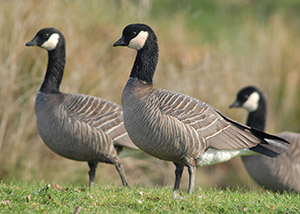Oregon Department of Fish and Wildlife biologists are aware of over 100 cackling geese that have died in various parts of the Willamette Valley over the last month.
Carcasses have been retrieved from Fernhill in Forest Grove, Sauvie Island Wildlife Area and east of Amity. Tests show a majority of the cackling geese died from aspergillosis, a fungal infection. Ongoing monitoring of the outbreak and additional tests are being performed to determine if there are other associated causes of death.
ODFW is asking anyone who sees clusters of dead geese or other birds to report it to the Wildlife Health Lab. Birds reported may be collected and sampled by ODFW, so please include the location, your name, contact info, time and date dead birds were observed in your report.
Report clusters of dead birds as soon as possible to 866-968-2600 or email [email protected]
Aspergillosis is common in the environment, but wild birds that are exposed to it can sometimes get sick and die.
Cackling geese are the smallest species of wild goose that winter in the Willamette Valley. They migrate thousands of miles this time of year which can lead to increased stress and susceptibility to disease.
It is difficult to determine exactly where cacklers are picking up the infection, but the fungal spores are often found in crop fields and natural refuge sites.
According to the CDC, aspergillosis cannot be spread from animals to people or between people. Most people breathe in aspergillus spores every day without getting sick. However, people with weakened immune systems or lung diseases are at a higher risk of developing health problems. Similarly, aspergillosis cannot be transmitted to pets or livestock on clothing or by direct contact. More info at https://www.cdc.gov/fungal/diseases/aspergillosis/risk-prevention.html
Goose hunting season is open in the Willamette Valley on some days, see the regulations at http://www.eregulations.com/oregon/game-bird/. While aspergillosis is not considered a threat to human health, hunters should take all normal precautions including not consuming birds that look sick; wearing rubber or latex gloves when cleaning game; practicing good hygiene and cooking birds to an internal degree of 165 degrees.

